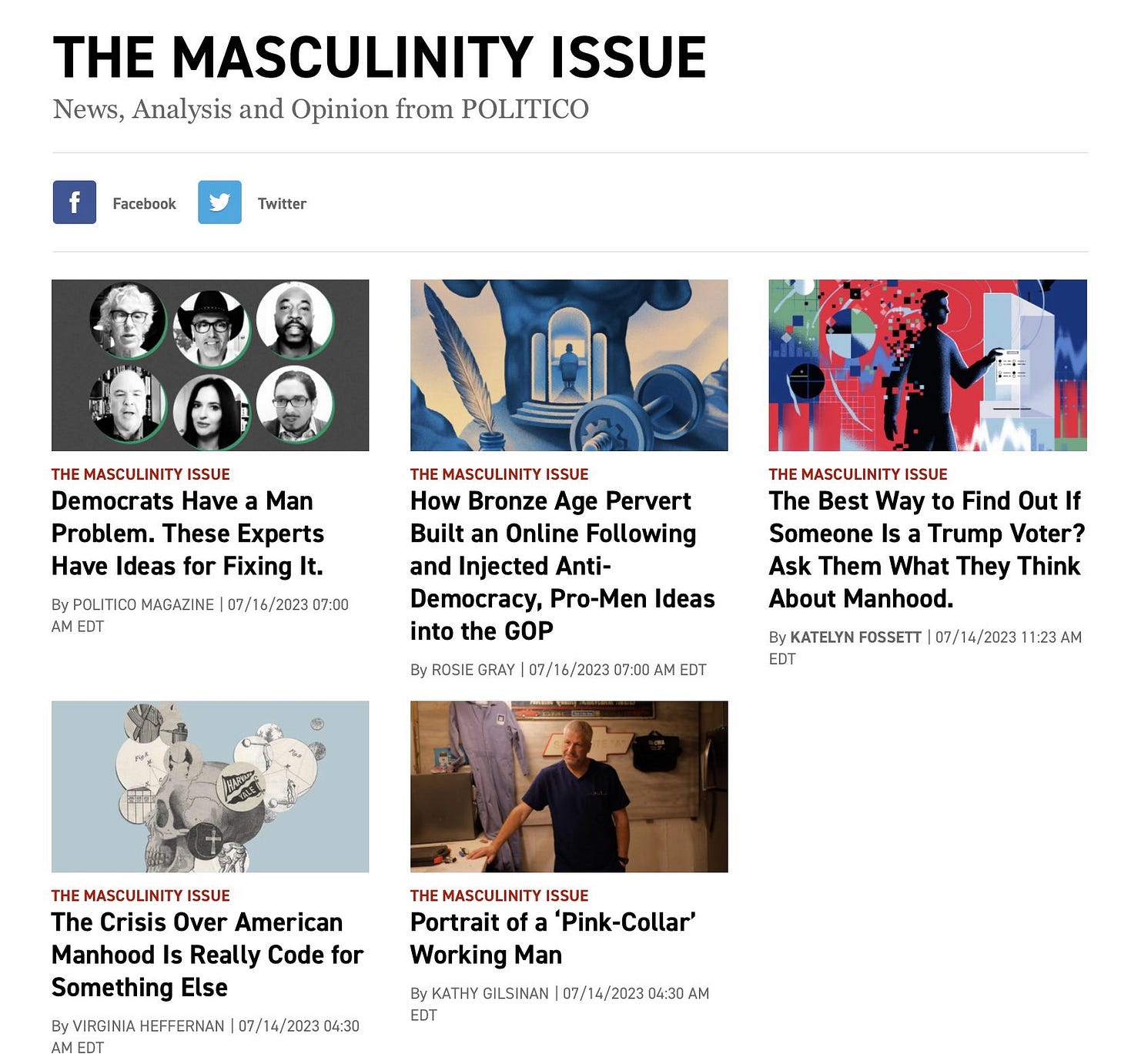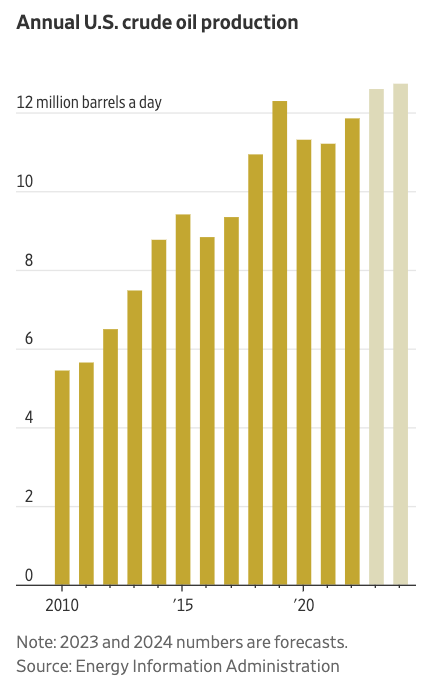📈 first Derivative [92]
Tuesday | July 18, 2023
Thanks to everyone who sent in feedback on affirmative action, always appreciate getting your thoughts on these topics. If you can catch your breath between watching Mission: Impossible - Dead Reckoning Part One, Barbie, and Oppenheimer, don’t miss Theater Camp, which I found really funny and genuinely sweet.
Good reading,
-Teddy
♂︎ Men are lost and society badly needs positive models of masculinity, argues Christine Emba in The Washington Post.
Meanwhile, women are surging ahead in school and in the workplace, putting a further dent in the “provider” model that has long been ingrained in our conception of masculinity. Men now receive about 74 bachelor’s degrees for every 100 awarded to women, and men account for more than 70 percent of the decline in college enrollment overall.
Past models of masculinity feel unreachable or socially unacceptable; new ones have yet to crystallize. What are men for in the modern world? What do they look like? Where do they fit? These are social questions but also ones with major political ramifications. Whatever self-definition men settle on will have an enormous impact on society.
I saw this one doing the rounds on Twitter and in my group chats. Emba does a great job here raising good points to her audience to the left while avoiding some cliché paths on the right.
To the extent that any vision of “nontoxic” masculinity is proposed, it ends up sounding more like stereotypical femininity than anything else: Guys should learn to be more sensitive, quiet and socially apt, seemingly overnight. It’s the equivalent of “learn to code!” as a solution for those struggling to adjust to a new economy: simultaneously hectoring, dismissive and jejune…
What would creating a positive vision of masculinity look like? Recognizing distinctiveness but not pathologizing it. Finding new ways to valorize it and tell a story that is appealing to young men and socially beneficial, rather than ceding ground to those who would warp a perceived difference into something ugly and destructive…
Emba also pre-empts some of the criticism of this discourse, that the “what’s wrong with men” discourse seems to be mostly women writing about men.
The other feature of Gilmore’s findings was that boys generally had to be ushered into manhood and masculinity by other men. And that seems to be a key link missing today.
There are plenty of mainstream voices trying to disseminate a positive articulation of masculinity, but the men that Emba interviews for her piece do seem like an odd selection (Scott Galloway?). It’s a shame she doesn’t venture much beyond the Twitterati and academia for her male authorities. While she was there, she might as well have engaged with recently retired professor, Harvey Mansfield’s book on the subject.
This Substack post from Conor Fitzgerald shares a lot with Emba’s though it is definitely coming from a different perspective. To her credit, her argument avoids taking many of the stances Fitzgerald criticizes, but he does hone in on some of their common observations with more emphasis, talking loosely about a concept that more conservative circles have taken to calling the Longhouse. And much of the backdrop for the “crisis” Emba identifies and how we got here can be found in this New York Times piece from Thomas Edsall.
🇫🇷🔥🚓 If you were following the French riots in France a few weeks ago, here’s a good analysis of the root causes of the social unrest in France that leads to perennial outbursts of violence. (Telos | Olivier Galland | Jul 2023)
Galland argues the root causes have largely not changed over time since the riots in 2005: mainly the “parallel economy” in this neighborhoods that inevitably bring inhabitants and police into conflict, the feeling of collective ostracism that engenders, and an increasing acceptance of violence as an appropriate response.
Living in a neighborhood where these delinquent activities are part and parcel of daily life can generate two kinds of reaction: either exit, or loyalty, to quote Albert Hirschman’s famous analysis (1970). Those who choose exit… have only one idea in mind: to flee these pathogenic neighborhoods, where success outside the framework of the parallel economy is extremely problematic. Those who choose loyalty do not condemn their fellows who engage in trafficking (even if they themselves don’t).
What has changed since 2005 is the role of religion,
Compared to 2005, the significant increase in the adherence of young people of foreign origin to Islam has also increased the cultural distance separating this section of youth from the rest of society. The rules of secularism in schools are poorly accepted and sometimes circumvented. Their application is experienced by these young people as injustice and discrimination. All in all, the feeling of belonging to the Nation is weak and is probably getting weaker.
…the amplifying effect of social media, and political opportunism:
In 2005, the prevailing feeling was one of stupefaction, and there was no real political exploitation of the events. Today, the context is obviously very different. The hysterization of political debate that has become a constant feature of this new legislature has naturally seized on this event. The extreme left party La France insoumise (LFI; led by Jean-Luc Mélenchon) is seeking to make political capital out of it, but is taking risks by appearing to half-heartedly support violence that the vast majority of French people condemn. As for its extreme right counterpart Rassemblement National (led by Marine Le Pen), it doesn’t need to say much to hope to profit from it. In any case, it seems unlikely that these political stances will have much influence on the course of events.
Indeed, one of the characteristics of this movement is its apolitical, or even anti-political, character. In riots, it’s the symbols of political institutions, or institutions at all, that are attacked. The rioters have no real demands to make. They are in no way looking for a political relay to express them. And that’s the difficulty for any government seeking to channel the movement: to whom should it talk, and what should it propose? Of the three terms that make up the title of Hirschman’s book, the first two of which I mentioned earlier (exit and loyalty), the third, voice, is missing: the questioning of institutions with the aim of obtaining a response to demands.
🇺🇸🛢 The US is on track for a record-breaking year in oil production, helping to keep prices lower despite supply cuts from Saudi Arabia and other OPEC producers (WSJ | Bob Henderson | Jul 2023)
OPEC and its allies so far this year have announced cuts amounting to about 6% of last year’s production. Crude prices have nevertheless slid by about 13%. Along with weaker-than-expected demand in China, prices are being weighed down by stepped-up production in other countries including Brazil, Canada and Norway. Increased output in countries outside OPEC is making up for about two-thirds of the alliance’s cuts…
The increased efficiency means EOG can earn as much from oil priced at $42 a barrel today as it would have from oil trading at $86 nine years ago. People familiar with Saudi oil policy have said the government’s budget requires an estimated $81 a barrel. Brent crude is trading around $76 a barrel, down 13% from the start of the year.
I remember back around 2010 when everyone was worried about peak oil and American dependence on foreign energy. Who would’ve predicted that the US would be the largest producer of oil in the world in 2023 and a net exporter? We have the shale revolution to thank for that.




